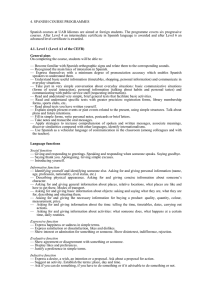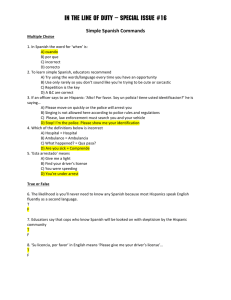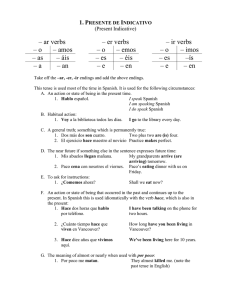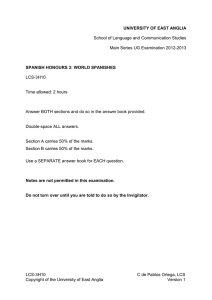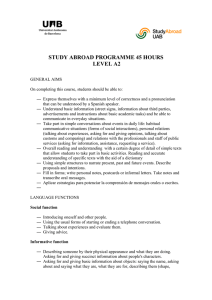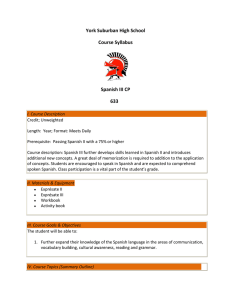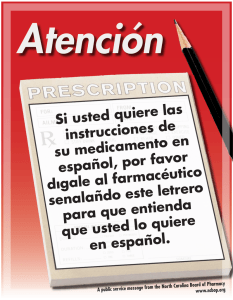SPANISH Courses 45 hours STUDY ABROAD PROGRAMME
Anuncio
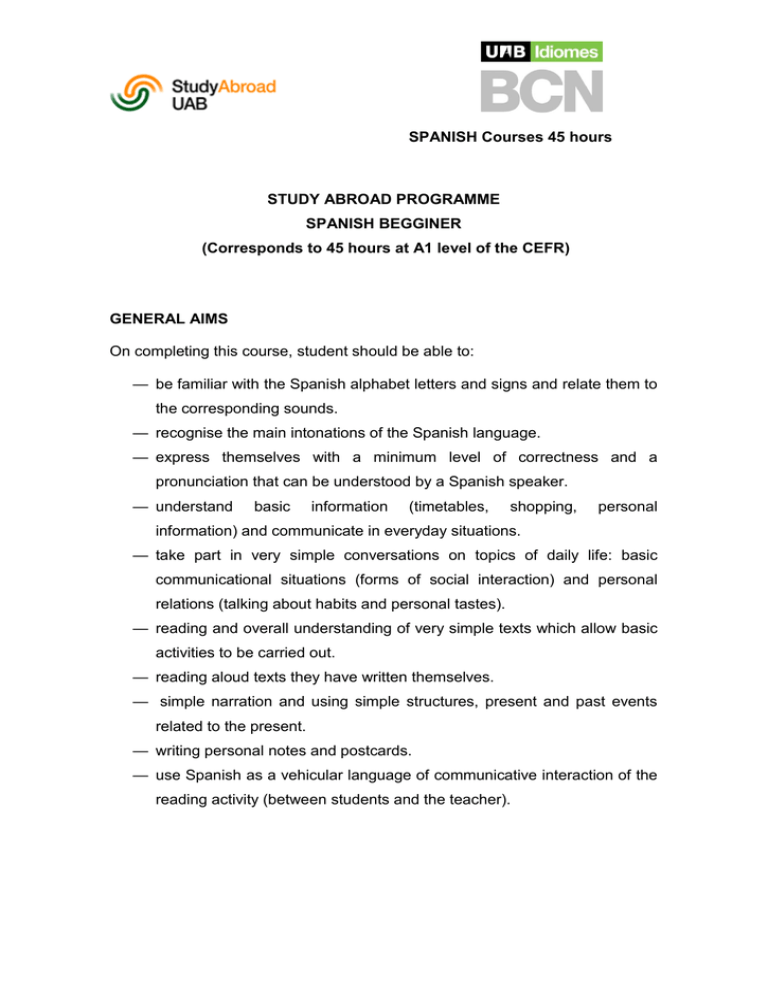
SPANISH Courses 45 hours STUDY ABROAD PROGRAMME SPANISH BEGGINER (Corresponds to 45 hours at A1 level of the CEFR) GENERAL AIMS On completing this course, student should be able to: — be familiar with the Spanish alphabet letters and signs and relate them to the corresponding sounds. — recognise the main intonations of the Spanish language. — express themselves with a minimum level of correctness and a pronunciation that can be understood by a Spanish speaker. — understand basic information (timetables, shopping, personal information) and communicate in everyday situations. — take part in very simple conversations on topics of daily life: basic communicational situations (forms of social interaction) and personal relations (talking about habits and personal tastes). — reading and overall understanding of very simple texts which allow basic activities to be carried out. — reading aloud texts they have written themselves. — simple narration and using simple structures, present and past events related to the present. — writing personal notes and postcards. — use Spanish as a vehicular language of communicative interaction of the reading activity (between students and the teacher). SPANISH Courses 45 hours LANGUAGE FUNCTIONS Social function — Offering and receiving greetings. Asking and responding to questions. Saying goodbye. — Saying thank you. Apologising. — Introducing one self. Informative function — Identifying yourself and other people. Asking for and giving personal information (name, surname, age, profession, nationality, civil status, etc.). — Describing people's physical appearance. Asking for and giving succinct information about people's character. — Asking for and giving general information about places: situation in relation to other places, what they are like and how to get there. Methods of transport. — Asking for and giving the necessary information for buying something: quality, quantity, colour, size, price. — Asking and telling the time: the time, timetables, carrying out an action. — Asking for and giving information about daily routines. Evaluative function — Expressing tastes and preferences. — Simple ways of justifying preferences. Inductive function — Expressing an intention or proposal. — Proposing an activity. Agreeing to the terms of a meeting: place, day and time. SPANISH Courses 45 hours Meta-linguistic function — Asking how to say something in Spanish. — Asking and telling how to spell a word and which punctuation signs are necessary. — Asking a telling about understanding an expression. — Asking someone to repeat something, to talk louder or slower. GRAMMATICAL CONTENT Determinants and quantifiers — Definite articles (el, la, los, las) and indefinite articles (un, una, unos, unas). — Demostratives: este/a, ese/a, aquel/lla. — Possessives: mi, tu, su, nuestro/a, vuestro/a, su, mis, tus, sus, nuestros/as, vuestros/as, sus. — Cardinal numbers. — Grades of meaning: muy. Nouns and adjectives — Gender and number. Verbs — Present tense of the most common regular and irregular verbs (trabajar, estudiar, ser, vivir, estar, ir, venir, cerrar, abrir, costar, empezar,…) and most frequent expressions of time (siempre, todos los días normalmente, a veces,…). — The verb 'haber'. Uses as an auxiliary and main verb. — Most common regular and irregular reflexive verbs: llamarse, levantarse, ducharse, acostarse,… — Verbs with emphatic pronouns: gustar, encantar (“a mí me gusta”). SPANISH Courses 45 hours — Modal verbs of obligation (tener que), desire (querer) and possibility (poder). — Simple past tense: most common regular and irregular verbs. hablar, ver hacer poner, ser,… Adverbs — Adverbs of state: bien, mal, regular… — Adverbs of place: aquí, allí, cerca, lejos… Pronouns — Personal stressed subject pronouns: yo, tú, él… — Personal unstressed indirect object pronouns: me, te, le, nos, os, les. — Reflexive pronouns: me, se te, nos, os, se. — Emphatic pronouns: a mí me, a ti te… — Interrogative pronouns: qué, cómo, quién, cuándo, por qué… Prepositions — Prepositions or prepositional expressions of place: en, entre, encima de, debajo de, dentro de…. Conjunctions — Frequently used conjunctions: y, o, pero, porque. Vocabulary — Introduction and familiarisation with the most useful words for da ily situations. SPANISH Courses 45 hours EVALUATION SYSTEM Exam 50 % o Writing: 20% o Speaking: 20% o Use of language: 10% Continuous assessment 50% o o o o o Writing: 10% Speaking: 10% Reading: 10% Listening: 10% Progress, contribution to the class and attitude: 10% CORRESPONDENCE OF GRADES (UAB IDIOMES BARCELONA) Scoring Grade 90% - 100% Sobresaliente 75% - 89,9% Notable 50% - 74,9% Aprobado (Pass) 0% - 49,9% Insuficiente TEACHING MATERIAL Textbook Corpas, J. et al., Aula Internacional 1 Nueva edición, Difusión. Grammar resources Gramática básica del estudiante de español, Difusión. Cuadernos de gramática española A1, Difusión. www.campus.difusion.com www.vert-taal.com www.aprenderespanol.org SPANISH Courses 45 hours STUDY ABROAD PROGRAMME SPANISH ELEMENTARY (Corresponds to 45 hours at A2 level of the CEFR) GENERAL AIMS On completing this course, student should be able to: — Express themselves with a minimum level of correctness and a pronunciation that can be understood by a Spanish speaker. — Understand basic information (street signs, information about third parties, advertisements and instructions about basic academic tasks) and be able to communicate in everyday situations. — Take part in simple conversations about events in daily life: habitual communicative situations (forms of social interactions), personal relations (talking about experiences, asking for and giving opinions, talking about customs and comparing) and relations with the professionals and staff of public services (asking for information, assistance, requesting a service). — Overall reading and understanding with a certain degree of detail of simple texts that allow students to take part in basic activities. Reading and accurate understanding of specific texts with the aid of a dictionary — Using simple structures to narrate present, past and future events. Describe proposals and intentions. — Fill in forms; write personal notes, postcards or informal letters. Take notes and transcribe oral messages. SPANISH Courses 45 hours LANGUAGE FUNCTIONS Social function — Introducing oneself and other people. — Using the usual forms of starting or ending a telephone conversation. — Talking about experiences and evaluate them. — Giving advice. Informative function — Describing someone by their physical appearance and what they are doing. Asking for and giving succinct information about people's characters. — Asking for and giving basic information about objects: saying the name, asking about and saying what they are, what they are for, describing them (shape, material, volume) and situating them (where they are and where they need to be put). — Asking for and giving information about activities and stories: what someone is doing in the present or the past, what is happening at a given time in the past or present, daily routines in the present and the past. — Asking for and giving information about someone's state of health or their mood: asking and telling how you feel, where it hurts, describing symptoms. Expressive function — Expressing satisfaction or dissatisfaction likes and dislikes enthusiasm or boredom. — Expressing interest, admiration for something or someone. Expressing a lack of interest, indifference or rejection. — Expressing physical pain or relief. — Expressing fear, fright, unease. Expressing confidence and conviction. SPANISH Courses 45 hours Evaluative function — Expressing agreement or disagreement with someone or about something. — Express tastes and preferences. — Valuing and comparing. — Asking for and giving opinions. — Justifying an opinion, valuation or statement. Inductive function — Asking and giving permission to do something. — Expressing desires, wishes, intentions or proposals. Asking about a proposal for action. — Proposing an activity. Agreeing to the terms of a meeting: place, day and time. — Asking if something can be done, should be done or if it is better not to do it. Meta-linguistic function — Asking a telling about understanding an expression. — Asking someone to repeat something, to talk louder or slower. — Asking for clarification about the meaning of a word or an expression. GRAMMATICAL CONTENT Determinants and quantifiers — Male, female and neuter demonstratives. — Possessives as adjectives: (mi, tu, su, nuestro/a, vuestro/a, su, mis, tus, sus, nuestros/as, vuestros/as sus) y pronominal (mío, tuyo, suyo…). — Indefinite pronouns: algún, ningún, algo, nada, alguien, nadie. SPANISH Courses 45 hours Nouns and adjectives — Gender and number. Irregular singular and plural agreements. Verbs — Regular and irregular reflective verbs. — Verbs with emphatic pronouns: interesar, parecer, encantar, doler (“A mí me duele la cabeza”). — Future expressions. Use of the present in future expressions (tomorrow, next week…). — Simple past tense: regular and irregular forms. — Indefinite past tense: most common regular and irregular verbs. (hablar, levantarse, llegar, ir, ser, venir,…). — Contrasting the simple past the the indefinite past tenses using the most frequent expressions of time (hoy, ayer, esta semana, la semana pasada…). — Expressions with estar + gerund: in present and imperfect tenses. Adverbs — Adverbs of state: bien, mal, regular, fatal… — Adverbs of time: ahora, después, luego, ya, todavía no… — Adverbs of comparison: más…que, menos…que, tan/ tanto…como Pronouns — Personal unstressed direct object pronouns: me, te, lo, la, nos, os, los, las. — Personal unstressed indirect object pronouns: me, te, se, le, nos, os, se, le. Combinations of direct and indirect pronouns. — Relative pronouns: que. SPANISH Courses 45 hours Prepositions — Most common prepositions: a, en, por, para, de, hacia, con, sin… Conjunctions — Frequently used conjunctions: y, o, pero, porque. Conjunctions that change before a vowel: y/e, o/u. Interrogative particles — qué, cómo, quién, cuándo, por qué,… Vocabulary — Formation of words by derivation. Word families: plata/plateado. — Irregular comparatives: mayor, menor, mejor… EVALUATION SYSTEM Exam 50 % o Writing: 20% o Speaking: 20% o Use of language: 10% Continuous assessment 50% o o o o o Writing: 10% Speaking: 10% Reading: 10% Listening: 10% Progress, contribution to the class and attitude: 10% SPANISH Courses 45 hours CORRESPONDENCE OF GRADES (UAB IDIOMES BARCELONA) Scoring Grade 90% - 100% Sobresaliente 75% - 89,9% Notable 50% - 74,9% Aprobado (Pass) 0% - 49,9% Insuficiente TEACHING MATERIAL Textbook Corpas. J. et al., Aula Internacional 2 Nueva edición, Difusión. Grammar resources Gramática básica del estudiante de español, Difusión. Cuadernos de gramática española A2, Difusión. www.campus.difusion.com www.vert-taal.com www.aprenderespanol.org SPANISH Courses 45 hours STUDY ABROAD PROGRAMME SPANISH LOW INTERMEDIATE (Corresponds to 45 hours at B1.1 level of the CEFR) GENERAL AIMS On completing this course, student should be able to: — Improve their level of accuracy in pronunciation and intonation in Spanish. — Use Spanish to interact effectively in the classroom, recognising and using communication mechanisms in this area. — Participate appropriately in everyday conversations, both face-to-face and by telephone. — Recognise moods from the way in which speakers express themselves and react appropriately. — Understand in general terms the information in texts about general subjects. — Understand and extract specific information from real information documents (posters, advertisements, informative leaflets, events listings, press articles, etc.). — Narrate, orally or in writing, past, present or future events, organising the information adequately. — Write letters, personal notes and postcards in an informal style. — Take notes and transcribe oral messages. — Extend knowledge of social and cultural aspect that encourages integration of the student into their learning environment. — Consolidate the use of the bilingual dictionary and begin to use a monolingual dictionary. SPANISH Courses 45 hours LANGUAGE FUNCTIONS Social function — Use conventional forms to ask for permission and to ask for a favour. — Say goodbye. Informative function — Describe and identify people or objects that could be in a group. — Ask someone what sort of mood they are in and tell them what mood you are in. — Request and give information about public transport (timetables, activities, location, etc.), travelling inside and out of the city (means of transport, timetables, services, distances, prices, etc.). — Talk about projects or future intentions explaining the conditions. — Situate an event or a story in time by ordering the parts (ask and say when something happened and in what order the events took place). — Talk about daily activities in the present and past tenses, explaining the circumstances. — Transmit information about one person to another. Expressive function — Expressing surprise. — Express interest or indifference. — Offer someone encouragement. — Express doubt or certainty. — Express annoyance or irritation. SPANISH Courses 45 hours Evaluative function — Expressing agreement or disagreement with someone or about something. — Express and ask for opinions. — Accept the opinion or reasoning of others. Inductive function — Offer to do something. — Invite someone to do something. Accepting or refusing an invitation. Make a date with someone. — Demand something, order someone to do something. Express prohibition. — Express an intention to do something and ask someone what they intend doing. — Ask for and give advice. — Ask for, give or deny permission. Meta-linguistic function — Take someone's word for something. — To counter-question and ask something again. — Enumerate and order the principles of an argument. — Express certainty about an announcement. GRAMMATICAL CONTENT Determinants — Indefinite pronouns: revision and consolidation. — Neuter demonstratives: use and syntax. — Indefinite pronouns: revision and consolidation. SPANISH Courses 45 hours — Grades of meaning: revision and consolidation. Nouns and adjectives — Gender and number: revision and extension. Special cases: el cava, el idioma… — use of some adjectives with the verbs 'ser' and 'estar'. Verbs — Verbs with emphatic pronouns: apetecer, doler, molestar, indignar, preocupar… — Future verb forms. — Affirmative and negative imperative of regular and irregular verbs. — Imperfect tense of regular and irregular verbs: different uses. — Contrast between the three indicative past tenses (perfect, indefinite and imperfect). — Frequently used prepositional verbs: quedarse en, llamar desde, quedar con, pasar por… — Verbs which use pronominal constructions: caerle bien/mal a alguien, llevarse bien/mal con alguien. — Introduction to the Present subjunctive. Adverbs — Adverbs of state: así, de esa manera, en absoluto… — Adverbs of time: aún (no), todavía (no), dentro de, ya. — Adverbs of doubt: quizá/s, tal vez, a lo mejor, probablemente… Pronouns — Combination of DO and IO pronouns (enclytic and proclytic): dímelo/ no me lo digas... SPANISH Courses 45 hours — Emphatic pronouns: a mí me..., a ti te...; revision and consolidation. Prepositions — Revision and extension of propositions and preprepositional elements (en, con, sin, por, para, desde, a, hasta, hacia, entre...). — Interrogative particles with prepositions: a quién, por quién, por dónde, desde dónde, desde cuándo... Conjunctions — Frequently used conjunctions. EVALUATION SYSTEM Exam 50 % o Writing: 20% o Speaking: 20% o Use of language: 10% Continuous assessment 50% o o o o o Writing: 10% Speaking: 10% Reading: 10% Listening: 10% Progress, contribution to the class and attitude: 10% CORRESPONDENCE OF GRADES (UAB IDIOMES BARCELONA) Scoring Grade 90% - 100% Sobresaliente 75% - 89,9% Notable 50% - 74,9% Aprobado (Pass) 0% - 49,9% Insuficiente SPANISH Courses 45 hours TEACHING MATERIAL Textbook Sans Baulenas, N. et al., Bitácora 3 (libro del alumno y cuaderno de ejercicios), Difusión / Corpas, J. et al., Aula 3 Nueva edición, Difusión. Recommended complementary reading (At the discretion of the professor) Colección Grandes personajes, Difusión. Colección Perfiles pop, Difusión. Serie Lola Lago, detective, Difusión. Grammar resources Gramática básica del estudiante de español, Difusión. Cuadernos de gramática española B1, Difusión. www.campus.difusion.com www.vert-taal.com www.aprenderespanol.org SPANISH Courses 45 hours STUDY ABROAD PROGRAMME SPANISH INTERMEDIATE (Corresponds to 45 hours at B1.2 level of the CEFR) GENERAL AIMS To succeed at this level student must demonstrate their capacity for linguistic activity that allows them to cover the following objectives in all the basic skills with a sufficient level of communicational effectiveness: Speaking — Communicate with a level of confidence on both habitual and less habitual matters related to their personal interests and specialist field. — Understand brief and clear public messages: announcements, signs, instructions, answering machines, most material recorded or broadcast in standard Spanish, etc. — Hold face to face or telephone conversations with known and unknown people on personal questions and understand the possible replies, ask for (if necessary) clarification, more detail or repetition of the explanation (standard and colloquial). — Describe a range of topics of interest, presenting them as a linear sequence of events. — Distinguish basic meaning from longer spoken information, presentations, interviews, documentaries, etc. (standard and colloquial). — Use strategies to promote communicative capacity using resources of a limited command of Spanish: paraphrase, ask for help, retrieve information for an interlocutor, etc. (standard and colloquial). SPANISH Courses 45 hours Writing — Understand texts aimed at the general public: poster, notes, warnings, information leaflets, advertisements, programmes, institutional information, administrative forms, etc. (standard). — Understand and write message related to daily activities: note4s, postcards, personal letters, etc. (standard and colloquial). — Understand basic press news information, opinion articles or journalistic reports (standard). — Read specialised language texts related to professional activity, studies or personal interests: magazine articles, technical documents, etc. (standard). — Be able to argue a case in writing with a reasonable level of coherence. Speaking-writing activities — Takes notes from brief, clear and precise oral information, spoken in a standard register. — Summarise information taken from a written text or oral message (standard). LANGUAGE FUNCTIONS Social function — Use the most usual and conventional forms of courtesy and social behaviour. Informative function — Give information about things that they have seen, heard or read. — Transmit information, opinions or comments from other people. SPANISH Courses 45 hours — Express hypothesis and supposition. — Announce proposals. Make plans. Expressive function — Express satisfaction or a lack of satisfaction, deception, happiness and boredom. — Express a desire. — Expressing surprise and disconcertment. — Express concern. — Express sorrow, pain or affliction. Evaluative function — Express interest, preferences, rejection, aversion and indifference. — Give, justify and defend an opinion. Show agreement and disagreement with respect to the opinions of others. Defend an opinion with arguments. Inductive function — Ask someone to do something or stop doing something directly (orders, requests, prohibitions) or indirectly (suggestions, advice, warnings). — Express a wish, desire or need to do something. — Make a complaint. — Requesting something, specifying the conditions. Requesting a service. Meta-linguistic function — Use of the necessary resources to maintain communication in the case of doubts or pauses. — Rectifying and correcting. — Emphasising part of the discourse. — Ask for explanations about grammatical content. SPANISH Courses 45 hours GRAMMATICAL CONTENT Determinants — Indefinite pronouns: mismo, otro, cualquier… — Construction (preposition) + definite article + que: con la que, por el que. Nouns and adjectives — Relative sentences. Verbs — Past perfect tense. — Consolidation of the use of past tenses. — Conditional tense. — Present subjunctive of regular and irregular verbs. — Introduction to mperfect subjunctive of frequently used regular and irregular verbs (venir, hacer, salir…). — Consolidation of future verb forms. — Phrasal verbs: acabar de, dejar de, volver a + infinitive; llevar + gerund. — Impersonal verb forms: with the pronoun 'se'; with the third person plural; with the third person singular. — Verbal agreement in the expression of the first and second conditionals ("Si hace buen tiempo…") and improbable situations (“Si me tocara la lotería…”) using 'si'. Adverbs — Adverbs of state: extension. — Adverbs of time: extension. — Adverbs of doubt: extension. SPANISH Courses 45 hours Pronouns — Relative pronouns: el/la/los/las que…, quien, cual, cuales. Prepositions — Extension of prepositions and prepositional phrases. Conjunctions — Revision and extension of conjunctions. — Introduction to conjunctions and conjunctional phrases of subordination. EVALUATION SYSTEM Exam 50 % o Writing: 20% o Speaking: 20% o Use of language: 10% Continuous assessment 50% o o o o o Writing: 10% Speaking: 10% Reading: 10% Listening: 10% Progress, contribution to the class and attitude: 10% CORRESPONDENCE OF GRADES (UAB IDIOMES BARCELONA) Scoring Grade 90% - 100% Sobresaliente 75% - 89,9% Notable 50% - 74,9% Aprobado (Pass) 0% - 49,9% Insuficiente SPANISH Courses 45 hours TEACHING MATERIAL Textbook Corpas, J. et al., Aula Internacional 3 Nueva edición, Difusión. Recommended complementary reading (At the discretion of the professor) Colección Grandes personajes, Difusión. Colección Novela histórica, Difusión. Grammar resources Gramática básica del estudiante de español, Difusión. Cuadernos de gramática española B1, Difusión. www.campus.difusion.com www.vert-taal.com www.aprenderespanol.org SPANISH Courses 45 hours STUDY ABROAD PROGRAMME SPANISH UPPER INTERMEDIATE (Corresponds to 45 hours at B2.1 level of the CEFR) GENERAL AIMS On completing this course, student should be able to: — Understand without any difficulty any conversation between native speakers on non-specialist themes, in standard register. — Follow an oral presentation in an academic environment on subject included in their studies (lectures, conferences, presentation and contributions by colleagues in the classroom), write and summarise information from notes taken during the class. — Recognise attitudes and moods in a speaker from intonation, gestures, rhythm, etc. — Understand genuine literary texts by contemporary authors, both Spanish ad Latin American, with some lack of vocabulary. — Intervene in conversations, discussions, debates, etc., Take part in conversations, discussions, debates, etc. on general subject matters, adjusting the discourse to the required register, formal or informal, with an appropriate control of the Spanish language and recognising idiomatic expressions appropriate to the level. — Speak about a subject with clarity and coherence for a brief period of time, suing the appropriate resources for discourse. — Write texts (personal letters, formal letters, etc.) adjust use of language to different models, using the appropriate vocabulary and register for each type of text. — Reproduce orally and in writing information, opinions and stories from other people. SPANISH Courses 45 hours LANGUAGE FUNCTIONS Social function — Encourage and calm someone down. — Apologise. — Offer congratulations. Informative function — Transmit information, orders and instructions from one person to another. — Narrate any fact or event or information transmitted bu other people stating the time references (previousness, simultaneousness, immediacy, etc.). — Formulate hypotheses referring to the present, the past and the future. Expressive function — Express different moods: happiness, sadness, resignation, satisfaction, anger, hope, etc. — Reproach, complain. — Show interest or rejection. Evaluative function — Judge and value people and periods (refute valuations). — Express conditions and request special conditions. Inductive function — Demanding, insisting on the fulfilment of something. — Threaten. SPANISH Courses 45 hours Meta-linguistic function — Organising a discourse: starting with a topic, enumerating, arguing a case, summarising, indicating the conclusion. — Asking for and giving explanations about points of grammar. GRAMMATICAL CONTENT Determinants — Structures with the neuter article 'lo' (lo que yo digo,…). Nouns and adjectives — Using adjectives as nouns with the neutral article 'lo' (lo curioso, lo malo,...). Verbs — Simple past and imperfect subjunctive. — Past perfect subjunctive. — Simple and composite conditional tense — Verbal agreement in the expression of an impossible condition (“Si lo hubiera sabido,…”) using the particle si. — Pronominal verbs. — Verbs of change: convertirse en/a , llegar a ser, etc. — Prepositional verbs: preocuparse por, acordarse de,... — Phrasal verbs. Adverbs — Adverbial conditional expressions: como, siempre que, siempre y cuando, depende de... SPANISH Courses 45 hours — Adverbial time expressions: así que, en cuanto, antes de que, hasta que, mientras, mientras tanto, de repente... Pronouns — Neuter pronouns: esto, eso, aquello, lo (“Eso no lo discute nadie”). Prepositions — Extension of the use of prepositions and prepositional sayings (por tanto, por si acaso, por cierto…). Conjunctions — Extension of conjunctional expression of subordination. Spelling — Extension. EVALUATION SYSTEM Exam 50 % o Writing: 20% o Speaking: 20% o Use of language: 10% Continuous assessment 50% o o o o o Writing: 10% Speaking: 10% Reading: 10% Listening: 10% Progress, contribution to the class and attitude: 10% SPANISH Courses 45 hours CORRESPONDENCE OF GRADES (UAB IDIOMES BARCELONA) Scoring Grade 90% - 100% Sobresaliente 75% - 89,9% Notable 50% - 74,9% Aprobado (Pass) 0% - 49,9% Insuficiente TEACHING MATERIAL Textbook Corpas, J. et al., Aula Internacional 4 B2.1 Nueva edición, Difusión. Recommended complementary reading (At the discretion of the professor) Colección Novela histórica, Difusión. Colección Descubre, Difusión. Grammar resources Las claves del nuevo DELE B2, Difusión. www.campus.difusion.com www.vert-taal.com www.aprenderespanol.org www.rae.es www.fundeu.es
